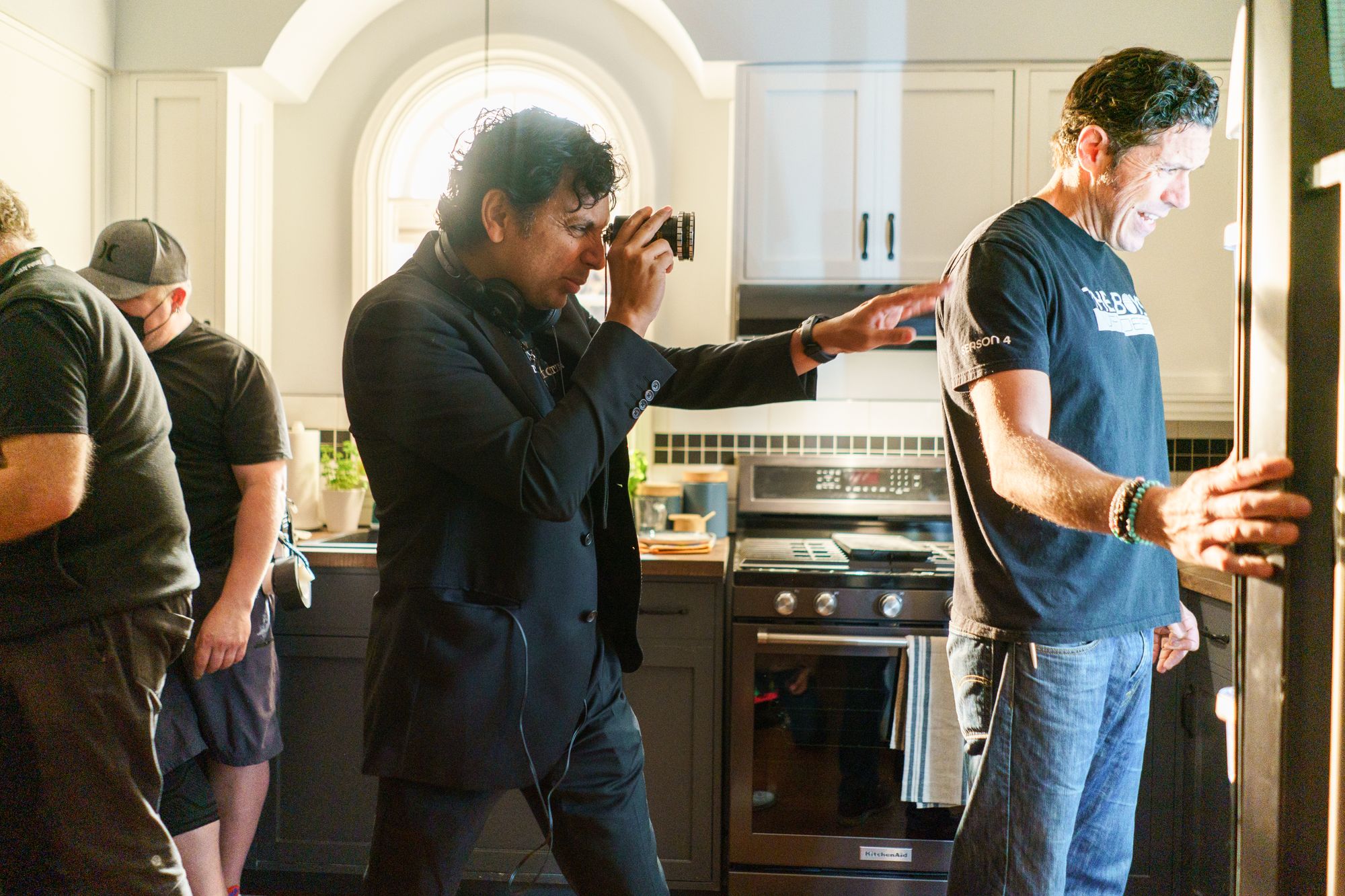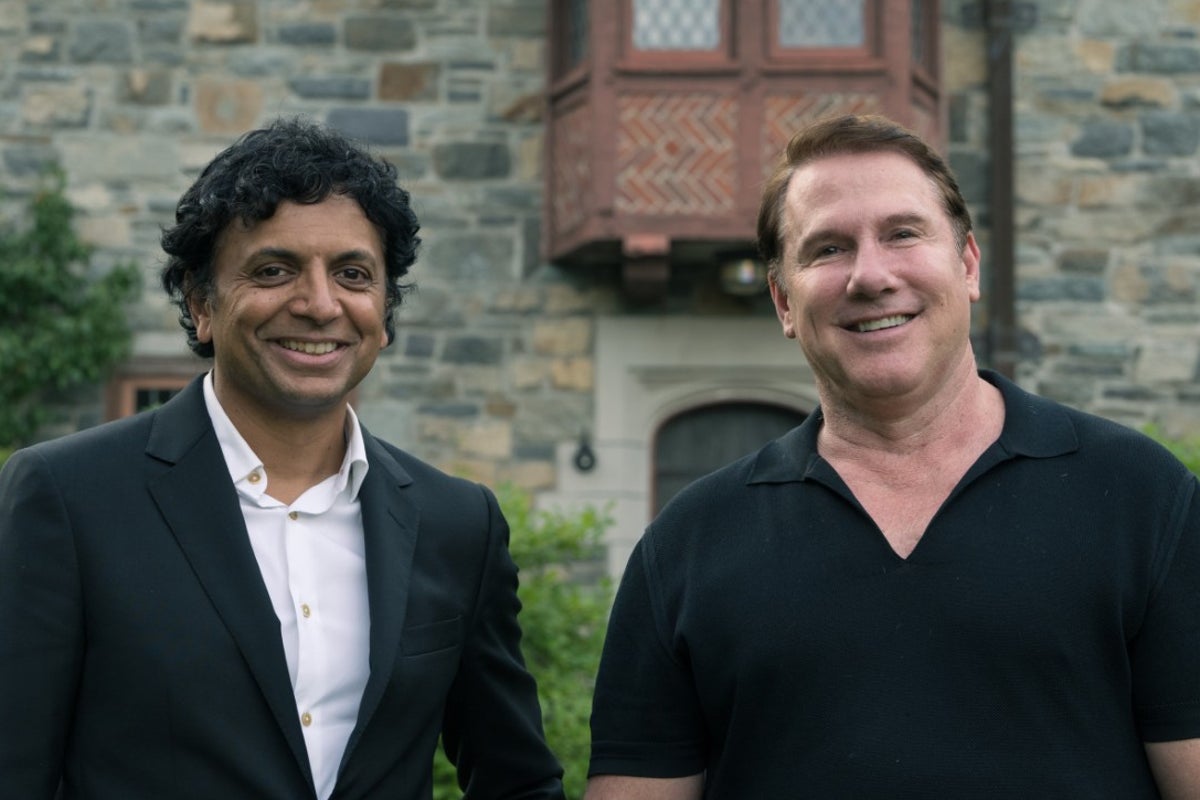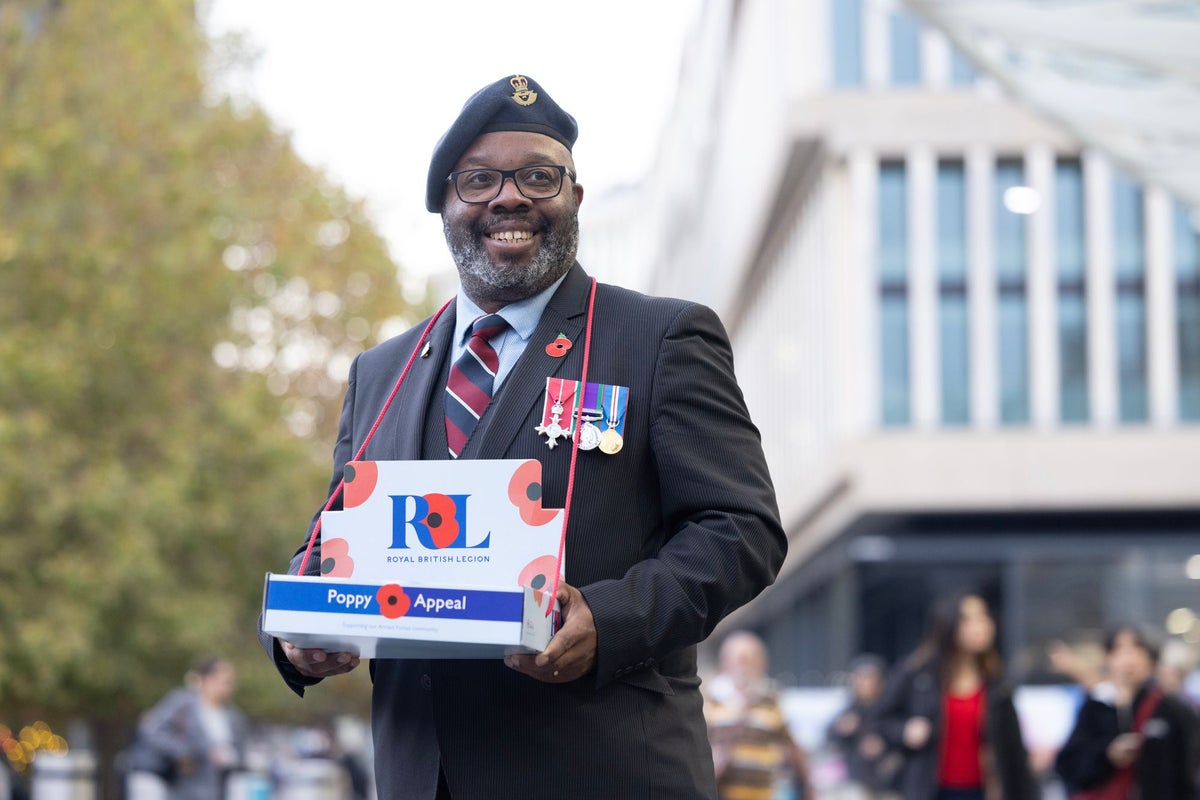It almost has the cadence of a joke: What do you get when you cross Nicholas Sparks and M Night Shyamalan? A love story with a twist.
There is, however, nothing remotely facetious about Remain, an out-of-the-blue, did-I-hear-that-correctly project that pairs Shyamalan, director of The Sixth Sense and master of the cinematic rug-pull, with Sparks, the bestselling author known for tear-jerking romance novels such as The Notebook.
Working from Shyamalan’s initial story idea – a love story with elements of mystery and the supernatural – Sparks has written Remain as a novel, while Shyamalan has concurrently directed it as a feature film starring Jake Gyllenhaal and Phoebe Dynevor. “Someone was asking us, ‘Do you think this will be the future of how people collaborate?’ I was like, ‘No. I don’t think it’ll ever happen again,’” laughs the filmmaker.
I’m speaking to both men over video call, a few days before the novel is published. (The film is already shot, but won’t be out for another year; after our interview, Shyamalan will beeline back to the editing room.) Both the film and novel tell the same story – about a man, grieving the death of his sister, who moves to Cape Cod and encounters a mysterious stranger. There are significant differences in the two tellings; Sparks describes the book and film as “identical twins raised by separate people”. Sitting chummily next to each other in an office in midtown Manhattan, though, Sparks, 59, and Shyamalan, 55, seem like consummate co-parents.
There’s scant romance in the origins of Remain: the two men were brought together by a shared talent agent, who suggested they meet with one another. Sparks had always been at least Hollywood-adjacent – with no fewer than 11 of his novels having been adapted for film – and was a fan of Shyamalan’s work. They met, hit it off, and discussed how a possible partnership might work, then went their separate ways. Months passed before Shyamalan, fresh off his 2024 serial-killer-at-a-pop-concert thriller Trap, revisited the idea.
If there was something prosaically businesslike about their meet cute, it was nevertheless one with a longstanding significance. At the beginning of Shyamalan’s career, when he was emerging as a wunderkind screenwriter of Generation X, he was asked to adapt Sparks’s The Notebook into a screenplay. “I was 25, and just married, and they asked me,” he recalls, “because the first thing I’d written was a love story, this screenplay everybody loved.” (That script was Labor of Love, which sold but ultimately remains unproduced.) At the time, The Notebook was a huge bestseller, the hottest of properties to be toted around Hollywood – and the offer symbolised, for Shyamalan, recognition. “It represented so many things,” he adds, “like ‘wow, they’re taking me seriously. I’m actually a real professional.’ When [Sparks’s name] came up again, 25 years later, all those emotions came back to me.”

Initially, the idea was that a third party would be brought in to direct the film adaptation of Remain, with Shyamalan simply handling the screenplay. “I had just done three very complicated, dark movies in a row,” Shyamalan says. “I did Old, Knock at the Cabin, and Trap. And I wanted to do something just pure, like a love story. And I thought, ‘Gosh, that’s that Nicholas thing that we were talking about.” So he agreed to direct the movie himself. “That changed things in a very dramatic way,” he says. “because then we had another problem: now you have two lone wolves. How do these two lone wolves work together?”
Shyamalan seems to use this phrase with a knowing irony – but there’s a truth there, too. Sparks is a novelist, accustomed to solitary work, and, while filmmaking is a far more collaborative endeavour, Shyamalan is very much an “auteur”, with a unilaterally focused sensibility. How would they work as a duo?
“There was an alchemy between Night and I,” says Sparks. “And we’ve become very good friends throughout this process. I’ve met his wife and family – wonderful, wonderful people.”
“You’ve trafficked in love for your whole career,” says Shyamalan, turning to his partner. “And I traffic in the supernatural. But it’s all something you believe in, questions of faith, whether in the supernatural or in love. So we’re already very close.”
“What was it?” Sparks asks. “Was it lack of ego? Was it confidence? Was it where we are in our respective lives? I do know we were both in a confident place in our lives – also both wanting to try different things.”

Shyamalan pauses and leans toward the camera, “Sorry about this, brother. I feel like we’re just having a conversation [with each other]. But… I do think there’s a peer aspect to this, that makes it very healthy. If he was an up-and-comer, or if I was, it would be different, with [more hand-holding]. We were able to trust each other 100 per cent.”
When they started work on Remain, both Shyamalan and Sparks were jousting with preconceived notions of their own artistry. “I’m aware of people’s perceptions of what I do,” says Sparks. “You can sum me up: I write a love story. Usually it’s set in North Carolina [where Sparks lives]. OK. So this becomes my own challenge – how do I make it different and new for readers? Give them what they want in an entirely new and different way?”
Sparks has a pleasant confidence about him; he is a man whose geniality belies both his extraordinary success and – it seems – a restless ambition of a sort. “I write not necessarily because I love writing, but because it’s in my nature to pursue a challenge,” he explains. “Like, ‘I wonder if I can write a book that stands the test of time.’ ‘I wonder if I can write a bestseller.’” (He could – two dozen times.) “ In fact, the only thing I don’t like about my job is the writing. But the pursuit of a challenge is why I do it.”
For Shyamalan, an artist with a stark and looping career arc, the baggage presents just as much of an issue. After The Sixth Sense made him a phenomenon in his twenties, Shyamalan enjoyed a drastic fall from grace with a run of panned films in the late 2000s and early 2010s. For many audiences, he became something of a punchline, reduced to a single screenwriting tic – the supposedly (but not really) ever-present “twists”. While Shyamalan has, over the last decade, enjoyed a glowing reappraisal among many film fans and critics, the rigid pigeonholing is something he has “fought with a lot”.
“I mean the audience just happened to meet me on that day,” he says, referring to the breakout success of The Sixth Sense. “Whereas the day before, I wrote Stuart Little. And the day before that I wrote a romance. It’s a complicated thing… when, for example, I did [the downbeat 2000 superhero drama] Unbreakable, people were like, ‘That wasn’t scary.’ But I didn’t say that it was gonna be scary!”
“It’s fascinating,” he continues. “People going, ‘It’s a pizzeria – where’s the pizza?’ But I never said I was a pizzeria. I might cook pizza one day, and then the next, I cook a cheeseburger. I want people to come to the restaurant for the chef, not the cuisine.” In this regard, Remain could well be a good test of the Shyamalan resurgence: ithas a few hairpin turns, for sure, but the story as a whole is an earnest romance, a love story first and foremost. Not, in other words, typical Shyamalan fare.

“I’m part of the problem as well,” he adds. “If I picked up a Stephen King novel and it wasn’t what I think of a Stephen King novel, I’m going to be like, ‘Damn, Stephen… why?’” Shyamalan grins. “It’s just a thing we have to figure out.”
Both Shyamalan and Sparks are effusive in their assessments of each other’s work: “It is no small feat to do what he does,” says the filmmaker, comparing his counterpart to John Grisham and Stephen King. “ I love his passion for the emotional architecture of a character – I really have taken that away.” Sparks, meanwhile, has come away with an even greater respect for his friend and collaborator. “I could not make a film like Night. He’s got skills that I didn’t even know you had to have,” he says.
Sparks shoots a warm, sincere smile in the direction of Shyamalan. “It’s gonna sound cheesy, but if your life is a series of chapters in a book, this was a chapter that was a surprise in all the greatest ways,” Sparks says. “I made a great friend, with a wonderful family. I learnt that great things can happen in the next chapter of your life, even if you don’t expect them.”
It’s not every day that a speculative networking meeting blossoms into a film, novel, and close personal friendship. You might even call it a love story. How’s that for a twist?
‘Remain’ is out now, published by Little Brown


